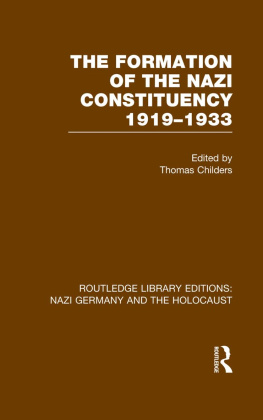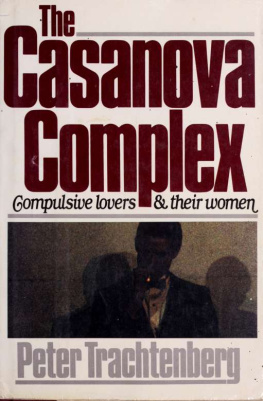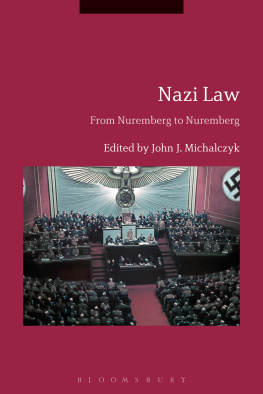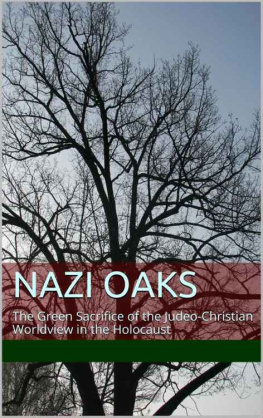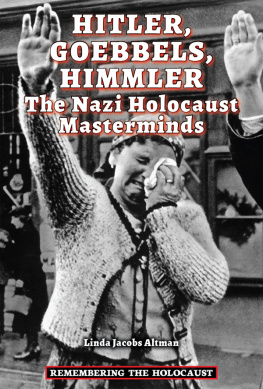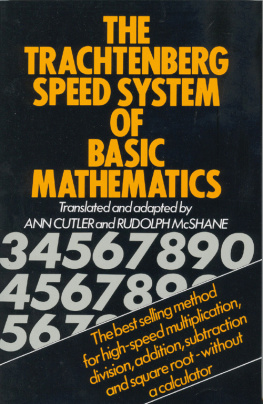Barry Trachtenberg - The United States and the Nazi Holocaust
Here you can read online Barry Trachtenberg - The United States and the Nazi Holocaust full text of the book (entire story) in english for free. Download pdf and epub, get meaning, cover and reviews about this ebook. publisher: Bloomsbury Publishing, genre: Politics. Description of the work, (preface) as well as reviews are available. Best literature library LitArk.com created for fans of good reading and offers a wide selection of genres:
Romance novel
Science fiction
Adventure
Detective
Science
History
Home and family
Prose
Art
Politics
Computer
Non-fiction
Religion
Business
Children
Humor
Choose a favorite category and find really read worthwhile books. Enjoy immersion in the world of imagination, feel the emotions of the characters or learn something new for yourself, make an fascinating discovery.

- Book:The United States and the Nazi Holocaust
- Author:
- Publisher:Bloomsbury Publishing
- Genre:
- Rating:5 / 5
- Favourites:Add to favourites
- Your mark:
- 100
- 1
- 2
- 3
- 4
- 5
The United States and the Nazi Holocaust: summary, description and annotation
We offer to read an annotation, description, summary or preface (depends on what the author of the book "The United States and the Nazi Holocaust" wrote himself). If you haven't found the necessary information about the book — write in the comments, we will try to find it.
The United States and the Nazi Holocaust — read online for free the complete book (whole text) full work
Below is the text of the book, divided by pages. System saving the place of the last page read, allows you to conveniently read the book "The United States and the Nazi Holocaust" online for free, without having to search again every time where you left off. Put a bookmark, and you can go to the page where you finished reading at any time.
Font size:
Interval:
Bookmark:

The United States and the Nazi Holocaust
For Albert J. Winn, 19472014
and
Gary Steller, 19462017
PERSPECTIVES ON THE HOLOCAUST
A series of books designed to help students further their understanding of key topics within the field of Holocaust studies.
Published:
Anti-Semitism and the Holocaust, Beth A. Griech-Polelle
The Holocaust in Eastern Europe, Waitman Wade Beorn
Holocaust Representations in History, Daniel H. Magilow and Lisa Silverman
Postwar Germany and the Holocaust, Caroline Sharples
Forthcoming:
Sites of Holocaust Memory, Janet Ward
The United States and the Nazi Holocaust
Race, refuge, and remembrance
BARRY TRACHTENBERG
Bloomsbury Academic
An imprint of Bloomsbury Publishing Plc

Contents
I am grateful to Rhodri Mogford at Bloomsbury for soliciting this book and to Beatriz Lopez and Kalyani Shankar for seeing it through the publication process. My interest in the relationship of the United States and the Nazi Holocaust began a quarter century ago while a masters student at the University of Vermont, and I remain indebted to Professors Doris L. Bergen, Mark A. Stoler, and David Scrase for their guidance and encouragement as I first engaged with these questions. I am also thankful to Jack Sutters of the American Friends Service Committee archives and Wendy Chmielewski of the Swarthmore College Peace Collection for their suggestions and assistance.
While at the University at Albany, I benefitted from conversations about this project with several friends, colleagues, and graduate students, including Malka Evan, Nolan Altman, Fardin Sanai, Lawrence Lichtenstein, Arthur Brenner, Carl Bon Tempo, Kori Graves, Monica Kim, Paul Stasi, Mitch Aso, Meredith Weiss, Bret Benjamin, Vesna Kuiken, Stacy Veeder, Eric Morgenson, Laura Auketayeva, and Kyle Stanton.
In 2014, I was invited to be the Balmuth Visiting Lecturer in the History Department at Skidmore College by Tillman Nechtman and to teach an advanced undergraduate course on the United States and the Holocaust. My thanks to Professor Nechtman for that opportunity and to the students in the course, especially Dorothea Trufelman and Sophie A. Don, for their engagement and willingness to explore this topic. Also in 2014, I presented portions of early chapters to participants in the Holocaust Educational Foundation of Northwestern Universitys Summer Institute on the Holocaust and Jewish Civilization, who provided many helpful suggestions, especially regarding racial violence in early-twentieth-century American history. Roger Brooks also encouraged me to consider what is at stake in the historical debates related to this topic and the reasons for its continued contentiousness.
Brad S. Hill, Eugene Sheppard, Lisa Leff, Adam Strom, Paul Mathewson, Jonathan Wiesen, Rachel Deblinger, and Melissa Jane Taylor generously shared with me many invaluable sources and suggestions on various parts of this work. Bill Swersey of HIAS kindly facilitated the permissions to reprint photographs from New Neighbors. Tim Chambers of Anchor Editions assisted me with the Dorothea Lange photograph.
At Wake Forest University, where I now hold the Michael H. and Deborah K. Rubin Presidential Chair of Jewish History, I regularly benefit from discussions on Jewish history and the Holocaust with many colleagues, including Dean Franco, Annalise Glauz-Todrank, Penny Sinanoglou, Mir Yarfitz, Lisa Blee, Ben Coates, Susan Rupp, and Michael Hughes. I am grateful to Debbie and Mike Rubin for their deep intellectual curiosity and support for Jewish Studies, to Dean of the College Michele Gillespie for providing me with the time to complete this manuscript, and to Kaeley McMahan of the Z. Smith Reynolds Library for tracking down many hard-to-find sources.
I am particularly grateful to Rebecca L. Erbelding of the United States Holocaust Memorial Museum for sharing her incomparable expertise at many stages of this project. Allison Brown of Henry Street Editing improved the manuscript tremendously and kept me on deadline. Both Daniel Greene of Northwestern University and Anna Hjkov of the University of Warwick read the manuscript in its entirety, made many important suggestions, and saved me from several embarrassing errors. Any remaining errors, of course, are my sole responsibility.
Jennifer Greiman remains my dearest companion, intellectual sounding board, and best friend. Our child, Harley Simone, is the light of our lives.
Over the years, I have had many conversations with Albert J. Winn and Gary Steller about the ethical demands placed on us by the Holocaust and its study. I dedicate this book to their memory.
It would not be entirely inappropriate to tell the history of the Nazi Holocaust with only a passing reference to the United States. In many respects, the United States was marginal to this cataclysmic event that had Europe at its center. The genocide By the time US leaders had learned of the mass slaughter of Jews, their capacity to intervene, should they have wanted to, was severely limited by the circumstances of the war itself. Sadly, even if the United States had fulfilled the wishes of those who later criticized it for inactionif it had more vigorously protested Hitlers rise to power, changed immigration laws and policies that prevented hundreds of thousands of Jews from finding sanctuary, and taken military action to curb the murder of civiliansthere is no reason to presume that there would not have still been a Holocaust and millions of victims to mourn.
Nevertheless, there remain very important historical questions to be considered about the United States and the Holocaust. Given its geographical distance from the fighting, resources, and size, the United States had the capacity to shelter a much greater number of refugees from Nazism than it ended up providing. It was home to large numbers of peopleJews and non-Jews alikewho publicly declared their willingness to provide for refugees and to ensure that they would not become a public burden. Furthermore, after the wars end (and until just recently), the United States was home to the worlds largest postwar Jewish community, which shouldered much of the responsibility for coming to terms with Nazisms assault on Judaism and the Jewish people. In addition, the Holocaust has come to occupy a central place in American society, with Holocaust memorials and museums found in cities and towns across the country, Holocaust education in school curricula from grade schools to the university level, and a seemingly endless stream of Holocaust-related films, books, and other cultural and academic works.
Popular perception of the relationship of the United States and the Holocaust tends to fall into one of two realms: either US troops were great liberators who freed concentration camp victims at the end of the war, or the country was so unwilling to intervene in the murder of European Jews that it was nearly complicit with the genocide Partys rise to power in 1933, to change the countrys immigration laws as the crisis worsened over the course of the 1930s, or to engage in military action to stop the murder of European Jews were made only after assessing their impact on the countrys domestic and international goals.
Advocates for the rescue of European Jewsboth within government and outside of itfought to steer the United States toward a more altruistic stance, but American sympathy toward oppressed peoples was severely diminished by what seemed to be more pressing concerns about the countrys economy, the security of its borders, and, most importantly, its changing racial makeup. While it is certainly reasonable to wish that the full extent of German Jewrys plight had been understood at the time and that such an understanding would have promoted greater action on their behalf, the reality was that the United States in the 1930s and early 1940s was no more immune from racist, isolationist, and nativist attitudes than most of the other countries that were unwilling to give sanctuary to large numbers of Jewish refugees or otherwise intervene to save Jewish lives.
Font size:
Interval:
Bookmark:
Similar books «The United States and the Nazi Holocaust»
Look at similar books to The United States and the Nazi Holocaust. We have selected literature similar in name and meaning in the hope of providing readers with more options to find new, interesting, not yet read works.
Discussion, reviews of the book The United States and the Nazi Holocaust and just readers' own opinions. Leave your comments, write what you think about the work, its meaning or the main characters. Specify what exactly you liked and what you didn't like, and why you think so.

